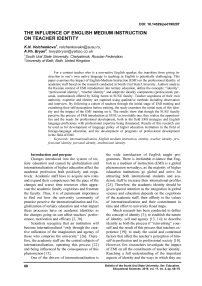The influence of English medium instruction on teacher identity
Автор: Volchenkova K.N., Bryan A.Ph.
Рубрика: Теория и методика профессионального образования
Статья в выпуске: 2 т.11, 2019 года.
Бесплатный доступ
For a content teacher who is a non-native English speaker, the transition from giving instruction in one’s own native language to teaching in English is potentially challenging. This paper examines the impact of English-Medium Instruction (EMI) on the professional identity of academic staff based on the research conducted at South Ural State University. Authors analyze the Russian context of EMI introduction into tertiary education, define the concepts: “identity”, “professional identity”, “teacher identity” and adapt the identity components (professional, personal, institutional) offered by Kling Soren to SUSU faculty. Teacher cognitions of their own authority, expertise and identity are captured using qualitative methods including observation and interview. By following a cohort of teachers through the initial stage of EMI training and examining their self-perceptions before training, the study examines the initial state of this identity and the impact of the EMI training on it. The results show that though the SUSU faculty perceive the process of EMI introduction at SUSU as inevitable one, they realize the opportunities and the needs for professional development, both in the field EMI strategies and English language proficiency with professional expertise being threatened. Results of this research can be used as for development of language policy of higher education institution in the field of foreign-language education, and for development of programs of professional development in the field of EMI.
Internationalization, english medium instruction, identity, teacher identity, professional identity, personal identity, institutional identity
Короткий адрес: https://sciup.org/147232605
IDR: 147232605 | DOI: 10.14529/ped190207
Список литературы The influence of English medium instruction on teacher identity
- Akkerman S.F., Meijer P.C. A Dialogical Approach to Conceptualizing Teacher Identity // Teaching and Teacher Education, 2011, no. 27 (2), pp. 308-319. DOI: 10.1016/j.tate.2010.08.013
- Archer L. The New Neoliberal Subjects? Young/er Academics' Constructions of Professional Identity // Journal of Education Policy, 2008, no. 23 (3), pp. 265-285. DOI: 10.1080/02680930701754047
- Beauchamp C., Thomas L. Understanding Teacher Identity: An Overview of Issues in the Literature and Implications for Teacher Education // Cambridge Journal of Education, 2009, no. 39 (2), pp. 175-189. DOI: 10.1080/03057640902902252
- Beijaard D., Meijer P.C., Verloop N. Reconsidering Research on Teachers' Professional Identity // Teaching and Teacher Education, 2004, no. 20 (2), pp. 107-128. DOI: 10.1016/j.tate.2003.07.001
- Beijaard D., Verloop N., Vermunt J.D. Teachers' Perceptions of Professional Identity: An Exploratory Study from a Personal Knowledge Perspective // Teaching and Teacher Education, 2000, no. 16 (7), pp. 749-764. DOI: 10.1016/S0742-051X(00)00023-8
- Bucholtz M., Hall K. Identity and Interaction: A Sociocultural Linguistic Approach // Discourse Studies, 2005, no. 7 (4-5), p. 585.
- DOI: 10.1177/1461445605054407
- Dewi A. Shifts in NNESTs' Professional Identity: An Impact of Language and Culture Immersion // Asian EFL Journal, 2007, vol. 9, no. 4, pp.111-125.
- Erikson E. Identity and the Life Cycle. New York, International Universities Press Publ., 1989. 267 p.
- Fierman W. Language and Education in Post-Soviet Kazakhstan: Kazakh-Medium Instruction in Urban Schools // The Russian Review, 2006, no. 65, pp. 98-116.
- DOI: 10.1111/j.1467-9434.2005.00388.x
- Flores M.A., Day C. Contexts which Shape and Reshape New Teachers' Identities: A Multi-Perspective Study // Teaching and Teacher Education, 2006, no. 22 (2), pp. 219-232.
- DOI: 10.1016/j.tate.2005.09.002
- Gee J.P. Social Linguistics and Literacies: Ideology in Discourses. 2nd ed. New York, Routledge Publ., 1996.
- Gee J.P. Identity as an Analytic Lens for Research in Education // Review of Research in Education, 2000, no. 25, pp. 99-125.
- DOI: 10.2307/1167322
- Harre R. The Singular Self. London, Sage Publ., 1998. 234 p.
- Holland D., Lachicotte W., Skinner D., Cain C. Identity and Agency in Cultural Worlds. Cambridge, Harvard University Press Publ., 1998. 368 p.
- Huang F. The Internationalisation of the Academic Profession // The Internationalization of the Academy Changes, Realities and Prospects, 2014, vol. 10, pp. 1-21.
- Kling J.S. Teacher Identity in English-Medium Instruction: Teacher Cognitions from a Danish Tertiary Education Context. Linguistics. University of Copenhagen. Faculty of Humanities, 2013, p. 225.
- Lillis T., Curry M.J. Academic Writing in a Global Context. The Politics and Practices of Publishing in English. New York, Routledge Publ., 2010. 210 p.
- Mead G. Mind, Self and Society. Chicago, The University of Chicago Press Publ., 1934. 174 p.
- Mitchell C., Weber S. Reinventing Ourselves as Teachers: Beyond Nostalgia. London, Routledge Publ., 1998. 192 p.
- DOI: 10.4324/9780203454497
- Rodgers C. The Development of the Personal Self and Professional Identity in Learning to Teach. New York, Routledge Publ., 2008, pp. 732-755.
- Sachs J. Teacher Education and the Development of Professional Identity: Learning to be a Teacher. Oxford, Routledge Publ., 2005, pp. 5-21.
- Stohl M. We Have Met the Enemy and He is Us: The Role of the Faculty in the Internationalization of Higher Education in the Coming Decade // Journal of Studies in International Education, 2007, vol. 11 (3-4), P. 359-372.
- DOI: 10.1177/1028315307303923
- Taylor C. Sources of the Self: The Making of the Modern Identity. Cambridge, Harvard University Press Publ., 1989. 613 p.
- Van Lier L. The Ecology of Language Learning: Practice to Theory - Theory to Practice. Available at: http://www.dilit.it/allegati/ Leo van Lier Slides.pdf (accessed 15.15.2018).
- Volchenkova K., Bryan A., Semenova Ya. Journey without Maps: Designing a Teacher-Training Course for English Medium Instruction // EDULEARN18 Proceedings, 2018, pp. 2758-2766.
- DOI: 10.21125/edulearn.2018.0737
- Webb G. Internationalisation of the Curriculum: An Institutional Approach. London, Routledge Publ., 2005, pp. 109-118.
- Wenger E. Communities of Practice: Learning, Meaning, and Identity. Cambridge, Cambridge Univ Press Publ., 1998. 318 p.


